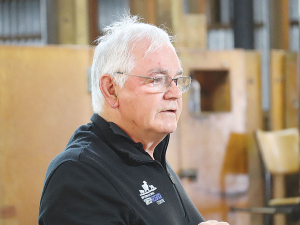The costs associated with shearing is leading to an increasing number of farmers looking at ways to reduce these costs and one is the self-shedding Wiltshire sheep breed.
Since 2020, Massey University researchers – headed by Professor Steve Morris – have been running a project aimed at building up a Wiltshire flock by crossing Romney ewes with a Wiltshire ram. The trial is being conducted at the university’s Riverside Farm in the Wairarapa. Since the project started, Massey has held regular field days to brief farmers on the progress of the trial.
Another field day was held recently to show the lambs from the third cross which are 7/8th purebred Wiltshires. Around 50 attended the day, which consisted of presentations by Morris and other researchers on different aspects of the trial.
At the end of the presentation, those attending the field day were able to go to the covered yards adjacent to the woolshed where the seminar was being held and look at the new season’s lambs.
One of the key purposes of the Massey trial is to get quantifiable research results that show the potential impacts of breeding a Wiltshire flock. But this will take time. Morris says they won’t know conclusively until the trial ends in 2025 and the resulting flock is 15/16th of a purebred Wiltshire.
“What we have seen so far is that the lambs seem to have a slightly higher survival rate, which surprises us, and that may be lamb vigour,” he told Rural News. “We also notice that they get up and move quicker than the Romney.”
Some initial trials have been done on meat yield and quality, but Morris says they have only killed small numbers of animals and when more stock are killed next autumn they will have a better idea on this aspect of the breed.
Farmer interest in the work being done by Massey is great with attendances at all the field days high. Morris believes this is driven by the low prices for wool and the high cost of shearing. He’s heard there is only one shearing gang operating in Northland and those running shearing gangs are finding it hard to get new staff to join their gangs.
“If you’re a farmer with say 4,000 ewes and your woolshed is deteriorating, there is a question mark about whether it is economic to build a new one given the money they are getting for their wool,” he explains. “The cost of labour and finding it in rural areas is also a factor – especially if the tasks are dagging, dipping and shearing.”
Morris says in the dairy industry many farmers are moving to once a day milking because of labour issues. He adds this is why they are doing this research work and liaising closely with farmers to show them what Massey is doing. Morris says that already some farmers are breeding up Wiltshire flocks but are about a year behind the university.



















